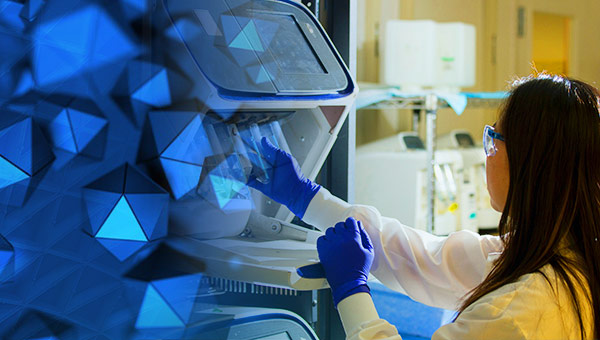Nam K. Tran, PhD, MS, FACB, Director of Clinical Chemistry and POCT
Kelly Lima, PhD Candidate, Department of Pathology and Laboratory Medicine
Larissa May, MD, MSPH, MSHS, Professor and Director of Emergency Department Antimicrobial Stewardship
Shelley Gillot, CLS Specialist, POCT Section
Stacy Yee, CLS Specialist, POCT Section
Introduction
The management of group A Streptococcus (GAS) pharyngitis has predominantly relied on rapid antigen detection tests (RADT).1 GAS associated pharyngitis is very common in children and resulting in significant morbidity. Accurate GAS diagnosis and appropriate antimicrobial therapy is recommended to prevent complications following infection. RADTs are quick, convenient, and cost-effective; however, their lower clinical sensitivity of RADTs may require microbiological culture confirmation. This practice of backing up negative GAS negative RADT results with culture is recommended by the Infectious Disease Society of America (IDSA) for children and adolescents.2 Unfortunately, microbiological culture is inherently slow and adds cost to GAS testing.
Lab Best Practice
As noted in our previous Lab Best Practice blog article on molecular diagnostics and influenza3, the use of nucleic acid testing has now arrived at the point of care. This week, the UC Davis Medical Center Emergency Department (ED) will implement the first point-of-care (POC) molecular diagnostics platform (cobas LIAT, Roche Diagnostics, Indianapolis, IN) at our institution.4 In addition to detecting influenza A/B and respiratory syncytial virus (RSV), the platform will also be able to detect GAS in as little as 15 minutes via throat swab. Rather than detecting ribonucleic acids (RNA), the new GAS platform will identify the bacteria using its deoxyribonucleic acid (DNA). Compared to RADT, the increased clinical sensitivity (98.3%) and specificity (94.2%) of GAS molecular testing eliminates the need for microbiological culture confirmation of negative results.4 To put it into perspective, the new molecular GAS test can detect as little as 5 to 20 bacteria per milliliter of sample. In contrast, GAS RADTs have been documented to need at least 10,000 to 100,000 bacteria per milliliter of sample to generate a positive result.5 This implementation of the GAS molecular platform will be expanded to several Primary Care Network and Hospital Based Clinic locations in February and also align with institutional efforts on antimicrobial stewardship to improve quality of care. At present, the IDSA has not released guidelines directly addressing the use of molecular GAS testing.2 It is expected updated IDSA guidelines to be published in the near future. Nonetheless, several lab best practices defined in these current guidelines remain pertinent to molecular testing. Refer to UC Davis Health Testing Notifications for assay and ordering specific details:
- GAS pharyngitis testing is usually is not recommended for children or adults with acute pharyngitis presenting with clinical and epidemiological features that strongly suggest a viral etiology (g., cough, rhinorrhea, hoarseness, and oral ulcers).
- Diagnostic testing for GAS pharyngitis are not indicated for children <3 years of age since acute rheumatic fever are rare in this population and the incidence of streptococcal pharyngitis and classic presentation of streptococcal pharyngitis are uncommon in this age group. Select children under 3 years of age with other risk factors such as older siblings with GAS infection may be considered for testing.
- Diagnostic testing or empiric treatment of asymptomatic household contacts of patients with acute streptococcal pharyngitis is not routinely recommended.
- Follow-up posttreatment molecular GAS testing may not be needed routinely but may be considered in special circumstances
References
- Felsenstein S, Faddoul D, Sposto R, et al. Molecular and clinical diagnosis of Group A Streptococcal pharyngitis in children. J Clin Microbiol 2014;52:3884-3889.
- Shulman ST, Bisno AL, Clegg HW. Clinical practice guideline for the diagnosis and management of Group A Streptococcal pharyngitis: 2012 update by the Infectious Diseases Society of America. Clin Infect Dis 2012;15:1279-1282.
- UC Davis Health Pathology and Laboratory Medicine Blog: https://blog.ucdmc.ucdavis.edu/labbestpractice/index.php/2017/11/16/molecular-pathogen-detection-at-the-point-of-care-next-generation-flu-testing/, Accessed on January 14, 2018.
- United States Food and Drug Administration (FDA) 510k approval website: https://www.accessdata.fda.gov/cdrh_docs/pdf15/K153544.pdf Accessed on January 14, 2018.
- Gazzano V, Berger A, Benito Y, et al. Reassessment of the role of rapid antigen detection tests in the diagnosis of invasive Group A Streptococcal Infections. J Clin Microbiol 2016;54:994-999.



